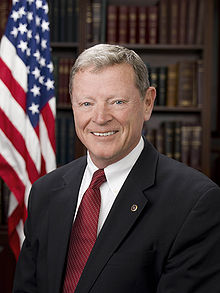Republicans push legislation to strip EPA of regulatory powers


Republican leaders in the U.S. House and Senate are moving forward with legislation that would strip the Environmental Protection Agency (EPA) of its authority to regulate greenhouse gases.
Today, the House Energy and Commerce Committee voted to amend the Clean Air Act to suspend EPA regulations addressing climate change. The effort to strip the EPA of its authority began early last month.
Michigan Rep. Fred Upton spearheaded the measure, deriding the EPA’s regulations as a “backdoor energy tax.” Upton cited rising gas prices as his latest reason to ditch caps on greenhouse gas emissions.
The EPA is obligated to act to regulate CO2 and other greenhouse gas emissions by order of a 2007 Supreme Court ruling in the case Massachusetts v. EPA that classified carbon dioxide as a pollutant.
The case was filed by a coalition of 12 states, and some local governments, which sought to make the Bush era EPA regulate carbon pollution from automobiles amid its repeated refusals.
Upton acceptsclimate change science, but has been indifferent toward taking any definitive action to address the effects of greenhouse gas emissions on the environment.
Upton is working in unison with Senator James Inhofe (R-OK) to pass an identical bill in the upper house. Inhofe is skeptical of science, and has referred to climate change as the “greatest hoax ever perpetrated on the American people.”
Inhofe has frequently been a partisan flamethrower; he has repeatedly compared his critics, and the EPA, to the Third Reich and Gestapo, respectively.
Today, Inhofe said that the EPA’s regulations would cost families in his state over US$3,100 annually in higher household energy costs. Democrats accused Inhofe of passing faulty figures off as facts.
Senate Republican leader Mitch McConnell added Inhofe’s measure as an amendment to a small business bill that is currently under debate in the Senate. Its fate remains uncertain.
However, it may be a moot effort: President Obama has vowed that he will veto any legislation that blocks the EPA’s climate change rules, which it began to gradually implement in January. The EPA has already carved out some exemptions.
In contrast to Inhofe's claims, studies by the non-partisan Congressional Budget Office, and the Energy Information Administration, have estimated the cost of even broader cap and trade energy legislation to be at most a dollar per day or as little as a few cents per day.
Other studies have projected that curbing carbon would yield an economic benefit due to the creation of “green jobs.” On the flip side, the U.S. Chamber of Commerce has estimated that cap and trade legislation could cost households $1,400 a year by 2020.
Cap and trade is a strategy for reducing climate change that was devised by free-market conservatives within the Reagan administration. President George H. Bush signed a cap and trade regulation regime into law in 1990.
This post was originally published on Smartplanet.com